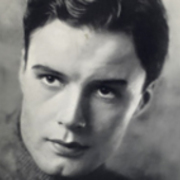
John Batten
The life of John Batten has been long overshadowed by his only sister Jean Batten, who won fame in the 30s as “the Greta Garbo of the skies”. Like Jean, John had a career that crescendoed in the 30s, followed by decades out of the limelight.
Born in Rotorua on 3 April 1903, John grew up both there and in Auckland. His father Frederick was a dentist. Mother Ellen played Juliet and Mary Queen of Scots in local theatre productions, organised rollerskating contests, and captained the women’s rowing club. John later told Jean Batten biographer Ian Mackersey that his mother was “a very beautiful, very thwarted woman who should have been an actress — she was definitely theatrical in temperament”.
During an extended OE in Australia and the United States, Batten was persuaded by a friend to give movies a try. Possessed of the same good looks as his mother and father, he got a job as an extra in Cecil B DeMille’s first, big-budget version of The Ten Commandments, and over the next six years won bigger parts in a handful of other American movies, including minor DW Griffith melodrama The Battle of the Sexes.
Batten lost much of his savings in the 1929 Wall Street crash. Over the next few years, after moving to the United Kingdom, his career briefly reached new heights. In 1929 he won a starring role in comic romance Under the Greenwood Tree, one of England's earliest talkies. Based on the Thomas Hardy novel of the same name, the film saw him playing a small-town musician battling for the romantic affections of a teacher.
The next few years were the busiest of Batten’s screen career. Alongside musical The Love Waltz, starring British/German performer Lilian Harvey, he co-starred in The Great Game (1930) and Men Like These (1932).
The Great Game was based around the world of British football. Sharing the screen with some real life soccer stars of the day, Batten played a wannabe battling to win a place in a struggling team, then helping them win victory in the final scenes. The plot for Men Like These is best explained by its alternative title, Trapped in a Submarine. The film saw him acting in a water tank at Elstree Studios; after making it, John spent time in New Zealand, where he tried unsuccessfully to interest newspapers in financing his sister’s flights. In this period he also loaned her money to sail to England. The two were never to speak again.
The film work just as quickly fell away, and by 1933 Batten was working as a receptionist. A few years later he and his then wife, novelist Madeleine Murat, moved to Tahiti with their daughter Penny. During World War II Batten spent time in the Royal New Zealand Navy. In 1943 he was given six months special leave to act in British war movie For those in Peril, the first feature directed by Ealing Studios legend Charles Crichton (A Fish Called Wanda).
Later legendary New Zealand filmmaker Rudall Hayward invited Batten to headline Song of the Wanganui. The 20 minute tourism short, released in 1961, appears to have marked his final film role. Batten played a naval officer who returns home to spend his holiday travelling on the Whanganui River.
Batten spent time living in New Zealand and from the late 60s onwards, the English county of Essex. John Batten passed away in the city of Colchester, on 10 August 1993. He was 90.
Profile written by Ian Pryor; published on 3 June 2014
Sources include
Ian Mackersey, Jean Batten: The Garbo of the Skies (Auckland: Macdonald Publishers, 1990)
‘John Batten - Promoting New Zealand to the World’ Ngā Taonga website. Loaded May 2014. Accessed 3 June 2014
'John Batten' BFI website. Accessed 3 June 2014
'John Batten' IMDB website. Accessed 3 June 2014